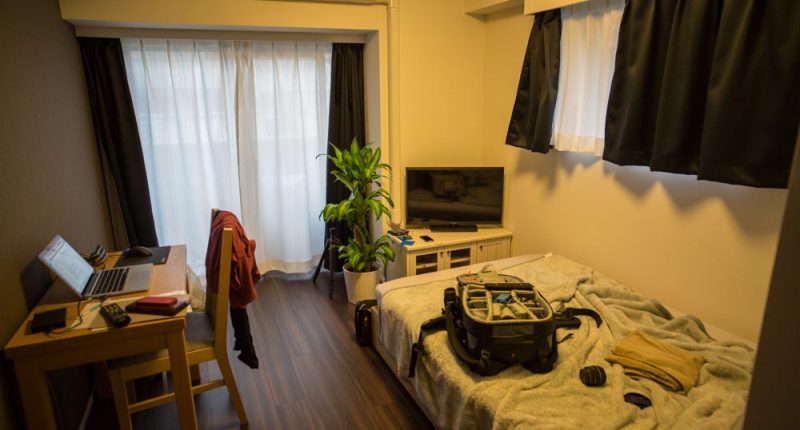The below gives an overview of living costs for foreign students in Tokyo excluding tuition fees (here you can read more about the cost of language schools). The exchange rate used to calculate the US dollar amounts is updated daily.
Accommodation
Accommodation is undoubtedly a student’s single biggest expense other than tuition fees. International students have three options:
- University-owned dormitories
- Guesthouses
- Private renting
Flat-sharing, while becoming slightly more popular in recent years, is still yet to catch on like it has in the West, and dormitory places are typically limited (if they are available at all). In 2015, about 85% of students were privately renting. Surveys suggest that the average monthly rent for students (including service fees) in Tokyo is approximately ¥60,000 ($415), although you should be aware of that this is not representative of the true cost of renting for the first time in the capital.
Transportation
Japan Rail East (JR East), by far the country’s biggest rail network operator, offers students about a 20% discount on commuter passes which are also valid at weekends. For travel within the 23 Special Wards of Tokyo this equates to a 3-month train commuter pass cost of about ¥20,000 ($138) for students. Naturally, the closer you live to university the cheaper transportation costs will be, and the average 1-month cost for students is estimated to be ¥5,000 ($35).
Food & Drink
The general cost of living and the scarcity of space in Japan and Tokyo especially has meant that kitchens in mansions are compact and functional with little space for food preparation. Partly because of this there are many restaurants and eateries offering lunch and dinner for ¥800-1000. Breakfast sets at cafes can be purchased for as little as ¥400. This, of course, is if you choose to eat out. Costs drop significantly if you are cooking yourself, and university canteens usually provide meals such as ramen and curry pork cutlets for ¥300-500. Convenience stores are also another good option, selling fresh salads, sandwiches, and other meals for ¥200-500. Average food costs per month is estimated at around ¥25,000.
Phone, Books, Medical
- Phone contract. There is no pay-as-you-talk system in Japan, but there are options for monthly phone contracts below ¥2,000 ($14).
- Textbooks and other study materials average about ¥3,000 ($21) per month.
- Medical insurance. All students are required to enter the national health insurance scheme which costs about ¥2,500 ($17) per month.
Social
Naturally, you don’t just want to study and survive during your student days, and having fun usually involves money—although there is much to do and see in Tokyo for very little money. You can read here more about the general cost of entertainment in Tokyo, but there are a number of restaurants, especially in the university districts, which cater for students by offering all-you-can-eat and all-your-can-drink courses for ¥3,000 or less. Moreover, at all universities there are a multitude of clubs and “circles” where you can do things like participate in Japanese tea ceremonies, play tennis, or learn dance.
What’s the big picture?
For students studying in Tokyo a monthly breakdown of expenses (excluding tuition fees) might look something like this:
| What? | JPY | USD |
|---|---|---|
| Accommodation | ¥60,000 | $415 |
| Transportation | ¥5,000 | $35 |
| Food & Drink | ¥25,000 | $173 |
| Phone / Books / Medical | ¥7,500 | $52 |
| Social | ¥15,000 | $104 |
| Total | ¥112,500 | $779 |
Can I work during my studies?
Yes. The student visa allows holders to work up to 28 hours per week and up to 8 hours per day during the school breaks with a few restrictions on the type of employment (games arcades and jobs in the adult entertainment industry are prohibited). The hourly wage for staff in restaurants and convenience stores is typically about ¥1,000, although some jobs may pay up to ¥1,200-1,300 for late-night shifts.
International students also have the option to teach their own language privately. One-to-one lessons pay about ¥3,000 per hour and you may also be able to do translation work which, again, should pay better than standard part-time jobs.

